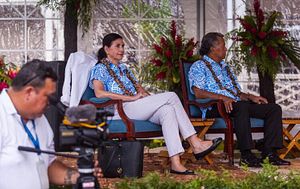Last week, Australia’s Minister of International Development Concetta Fierravanti-Wells made some forceful comments about Chinese aid in the Pacific, which kicked off discussion across the region.
Fierravanti-Wells claimed that Beijing has been constructing “useless buildings” and roads to “nowhere” in Pacific Island states, leading to a formal protest by the Chinese government. Samoa’s prime minister said her remarks were “insulting”
The reality is that China’s aid into the Pacific is not as ineffective as Fierravanti-Wells has described it. Jonathan Pryke of the Lowy Institute explains that although China’s aid program in the Pacific is “opaque,” its outcomes seem to be not as negative as the minister described. The statements also had the side effect of calling into question Australia’s aid projects in the region, with the editor of the Vanuatu Daily Post writing that although some suspicion remains toward Chinese aid in the country, the road projects Beijing has funded surpass those paid for from Canberra’s pocket.
While the details about the effectiveness of, and the motives for, Chinese aid in the Pacific can be debated, it is intriguing to delve into why the minister decided to make such remarks to begin with. Why did the Australian government decide to make mention of this issue now, and what it is they hoped to achieve by raising these concerns?
These were premeditated remarks made by Fierravanti-Wells to The Australian newspaper, indicating that there must have been some strategy behind the decision to speak out on the issue. The government would have been well aware that China would immediately bristle at the accusation, and that it would add to the current tensions between the two states.
Even if the Australian government holds the genuine belief that Chinese aid in the Pacific is simply a series of “useless buildings” and roads to “nowhere,” the Chinese reaction to such a harsh set of statements was predictable. So why would Australia be keen to upset Beijing in this way?
There are the obvious “territorial” claims to uphold. Australia is the dominant actor throughout the Pacific, and it wishes to remain so. It feels threatened by increasing Chinese influence and therefore wishes to discredit Chinese activity in the region as less “genuine” than Australian activity. Yet the perplexed and annoyed response from Pacific Island states over the minister’s statements indicate that Australia’s paternal attitude toward the region might be counterproductive. The tone of the minister’s remarks seem to portray Pacific Island states as naïfs simply being manipulated by a larger power, rather than sovereign states capable of forging their own bilateral relationships, and understanding their own requirements.
The comments seem to be an offensive move against the Chinese government, potentially a preemptive signal about Australia’s intentions to not meekly acquiesce to any current or future Chinese policies that may impact Australia. With almost daily commentary in the Australian press about Chinese influence, the government may also have been sending a domestic signal to placate these concerns.
However, this episode should raise the question of whether such a forthright display of displeasure was a smart tactic by the Australian government, especially given the obvious Chinese reaction, or whether a more restrained stoicism would have been a more appropriate posture. In general, Beijing takes a very defensive stance toward criticism of its policies, as well as other states’ concern about its rise. Beijing perhaps has yet to develop a refined understanding of the way other states perceive its growing power, or it could be an outgrowth of the Chinese state’s authoritarian nature. Regardless, it remains the reality that needs to be considered.
As a middle power negotiating its interests around larger players, Australian policymakers should be more adept at navigating these type of sensitivities, especially becoming more au fait with how China approaches its aid delivery. Powerful states have less of a requirement for sophisticated approaches, yet they are essential for states like Australia, which will always be in a position of having to react to the movements of greater powers.
If the intent of Fierravanti-Wells was to signal to China that Australia will not be sidelined from its traditional regional influence (something that isn’t under any immediate threat, with Australia providing almost two-thirds of total regional aid), then the execution was a clumsy one. Not only did her remarks unnecessarily prick Beijing’s defensive posture, they also confused the Pacific Island states Australia is supposedly trying to maintain influence within.

































